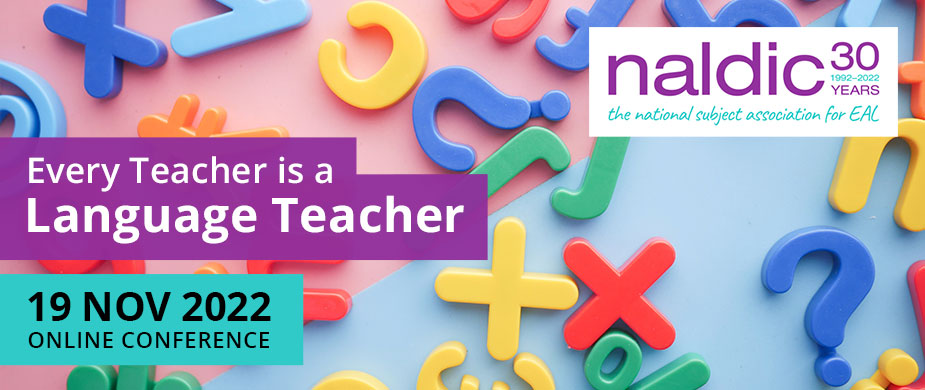The NALDIC Blog is back with exciting work on EAL policy, practice and research!
 It is NALDIC’s mission to support and advocate for the community of EAL learners and practitioners, and through the blog we will continue to share ideas and resources (for free!) taking a stand on the issues that face us all and showcasing the fantastic work that EAL practitioners and young people do every day. Half-termly, we will post blog articles from researchers, students and practitioners who will bring practical advice and share their experience of teaching, learning about teaching and/or researching EAL and multilingualism more broadly. In line with the theme of the upcoming 30th Anniversary conference, the new series of the NALDIC Blog aims at broadening the conversation on EAL, multilingualism and language education by including perspectives and experiences from other language education-related contexts and sectors.
It is NALDIC’s mission to support and advocate for the community of EAL learners and practitioners, and through the blog we will continue to share ideas and resources (for free!) taking a stand on the issues that face us all and showcasing the fantastic work that EAL practitioners and young people do every day. Half-termly, we will post blog articles from researchers, students and practitioners who will bring practical advice and share their experience of teaching, learning about teaching and/or researching EAL and multilingualism more broadly. In line with the theme of the upcoming 30th Anniversary conference, the new series of the NALDIC Blog aims at broadening the conversation on EAL, multilingualism and language education by including perspectives and experiences from other language education-related contexts and sectors.
The voice of the Chair
NALDIC has had a significant contribution to education across the UK, with a specific focus on supporting teachers who are teaching pupils learning English as an additional language (EAL). This support has taken many forms over the last 30 years with an annual conference, quarterly publications, and professional learning events. These multiple forums have enabled teachers and other professionals to consider the ways in which social and political changes have transformed society and this has resulted in today’s classrooms becoming culturally and linguistically diverse. To address these changes, the work of NALDIC as a subject association for EAL has emphasised the need to move beyond the boundaries of seeing language as an object, or an individual cognitive process, and instead viewing language as a social practice, where learning and teaching are reciprocal processes that involve people, their interpretations and the ways in which they make meaning in the world in which they live. These messages about the language learning process have supported teachers and other professionals in becoming aware that students bring who they are, what they believe, where they live, and what they have experienced to the meaning-making process. As a result, teachers have been able to develop classroom practices that are transformative in nature, thus addressing issues of equity, access and justice for pupils learning EAL.
NALDIC’s conferences and professional learning events have also provided spaces where colleagues have been able to form communities of practice within regional and nationwide spaces. These spaces have enabled colleagues to exchange ideas and perspectives and at the same time generate partnerships that offer valuable peer support.
Another important aspect of NALDIC’s work is the EAL journal. The EAL journal, NALDIC’s termly professional journal of practice, research and activism has continued to provide a voice for and support to our communities of practice since its inception in 2016. Each term, the EAL Journal addresses a different topic in its cover feature articles as well as having a range of regular contributions including a research review, our ‘research shorts’, CPD articles, comment pieces and our Teacher Voice section – to name but a few.
As we consider our ever-changing social, cultural, political and educational contexts, our priorities for going forward as a subject association are very much linked to the continuation and development of teacher education for both pre- and in-service teachers. Accredited courses to provide opportunities in becoming an EAL lead or coordinator have been, and will continue to be, developed in partnership with University settings. Accredited courses are powerful engines that enable all educators to develop the knowledge, skills and dispositions that allow them to challenge the marginalization of other languages, and to develop linguistically and culturally responsive practices for today’s multilingual classrooms.
Current and future challenges
Click here to watch the full interview with Yvonne Foley, Chair of NALDIC


